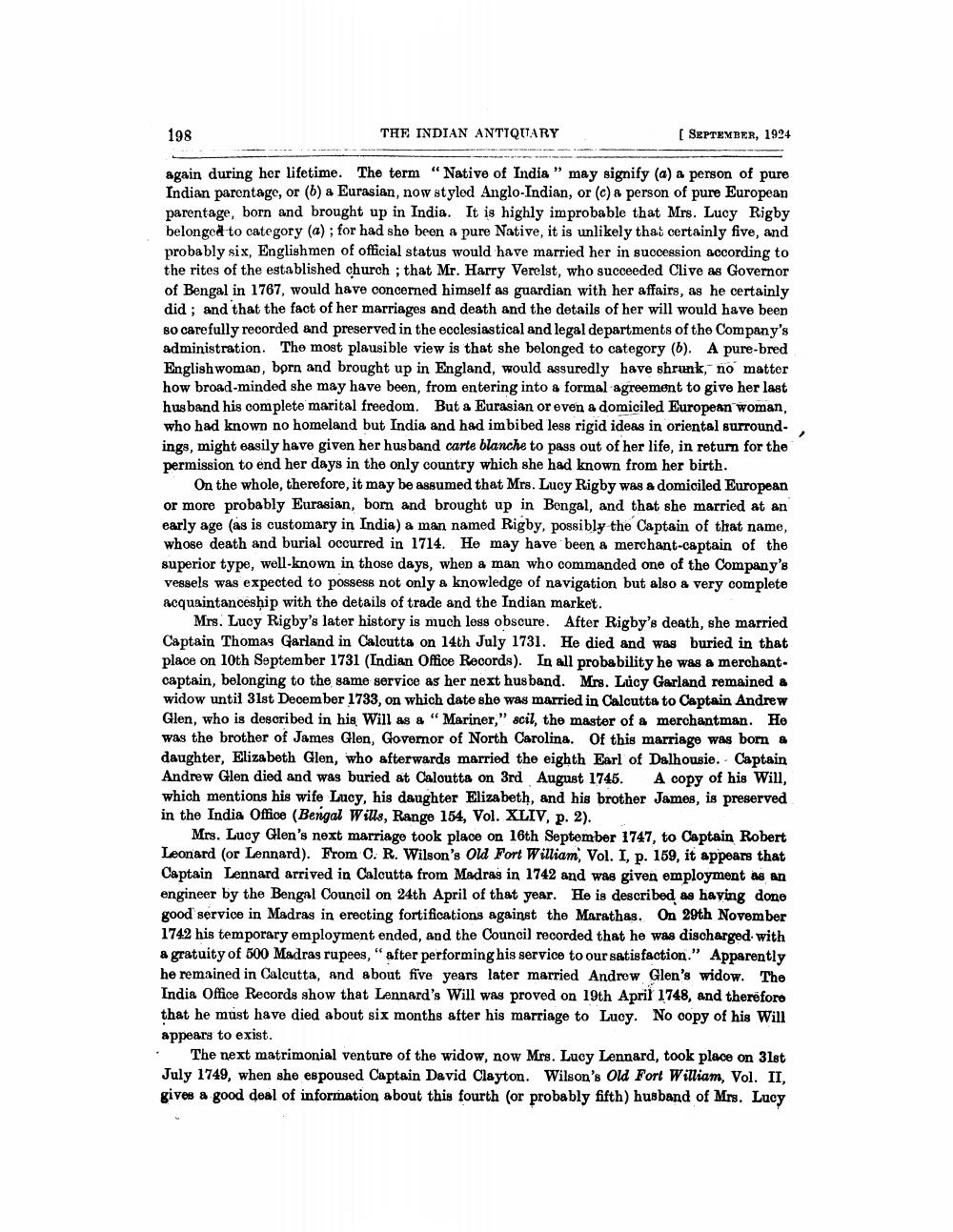________________
198
THE INDIAN ANTIQUARY
[ SEPTEMBER, 1924
again during her lifetime. The term "Native of India" may signify (a) a person of pure Indian parentage, or (b) a Eurasian, now styled Anglo-Indian, or (c) a person of pure European parentage, born and brought up in India. It is highly improbable that Mrs. Lucy Rigby belonged to category (a); for had she been a pure Native, it is unlikely that certainly five, and probably six, Englishmen of official status would have married her in succession according to the rites of the established church ; that Mr. Harry Verelst, who succeeded Clive as Governor of Bengal in 1767, would have concerned himself as guardian with her affairs, as he certainly did ; and that the fact of her marriages and death and the details of her will would have been so carefully recorded and preserved in the ecclesiastical and legal departments of the Company's administration. The most plausible view is that she belonged to category (6). A pure-bred English woman, born and brought up in England, would assuredly have shrunk, no matter how broad-minded she may have been, from entering into a formal agreement to give her last husband his complete marital freedom. But a Eurasian or even a domiciled European woman, who had known no homeland but India and had imbibed less rigid ideas in oriental surroundings, might easily have given her husband carte blanche to pass out of her life, in return for the permission to end her days in the only country which she had known from her birth.
On the whole, therefore, it may be assumed that Mrs. Lucy Rigby was a domiciled European or more probably Eurasian, born and brought up in Bengal, and that she married at an early age (as is customary in India) a man named Rigby, possibly the Captain of that name, whose death and burial occurred in 1714. He may have been a merchant-captain of the superior type, well-known in those days, when a man who commanded one of the Company's vessels was expected to possess not only a knowledge of navigation but also a very complete acquaintanceship with the details of trade and the Indian market.
Mrs. Lucy Rigby's later history is much less obscure. After Rigby's death, she married Captain Thomas Garland in Calcutta on 14th July 1731. He died and was buried in that place on 10th September 1731 (Indian Office Records). In all probability he was a merchant. captain, belonging to the same service as her next husband. Mrs. Lucy Garland remained a widow until 31st December 1733, on which date she was married in Calcutta to Captain Andrew Glen, who is described in his Will as a "Mariner," scil, the master of a merchantman. He was the brother of James Glen, Governor of North Carolina. Of this marriage was born a daughter, Elizabeth Glen, who afterwards married the eighth Earl of Dalhousie.. Captain Andrew Glen died and was buried at Caloutta on 3rd August 1745. A copy of his Will, which mentions his wife Lucy, his daughter Elizabeth, and his brother James, is preserved in the India Office (Bengal Wills, Range 154, Vol. XLIV, p. 2).
Mrs. Lucy Glen's next marriage took place on 16th September 1747, to Captain Robert Leonard (or Lennard). From C. R. Wilson's Old Fort William, Vol. I, p. 169, it appears that Captain Lennard arrived in Calcutta from Madras in 1742 and was given employment as an engineer by the Bengal Council on 24th April of that year. He is described as having done good service in Madras in erecting fortifications against the Marathas. On 29th November 1742 his temporary employment ended, and the Council recorded that he was discharged with a gratuity of 500 Madras rupees," after performing his service to our satisfaction." Apparently he remained in Calcutta, and about five years later married Andrew Glen's widow. The India Office Records show that Lennard's Will was proved on 19th April 1748, and therefore that he must have died about six months after his marriage to Lucy. No copy of his Will appears to exist.
The next matrimonial venture of the widow, now Mrs. Lucy Lennard, took place on 31st July 1749, when she espoused Captain David Clayton. Wilson's Old Fort William, Vol. II, gives a good deal of information about this fourth (or probably fifth) husband of Mrs. Lucy




